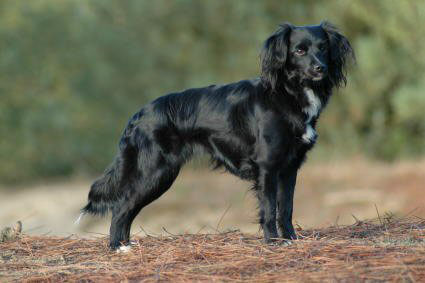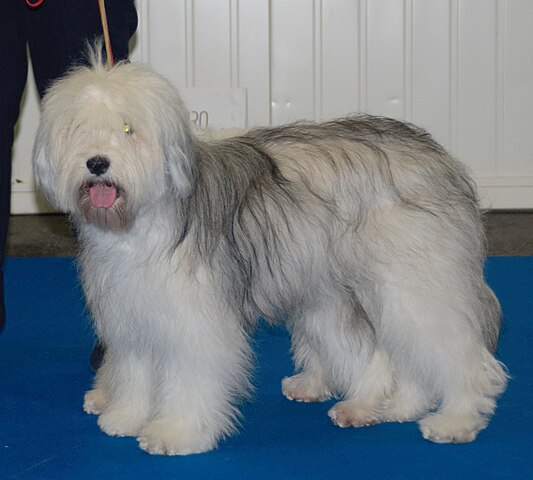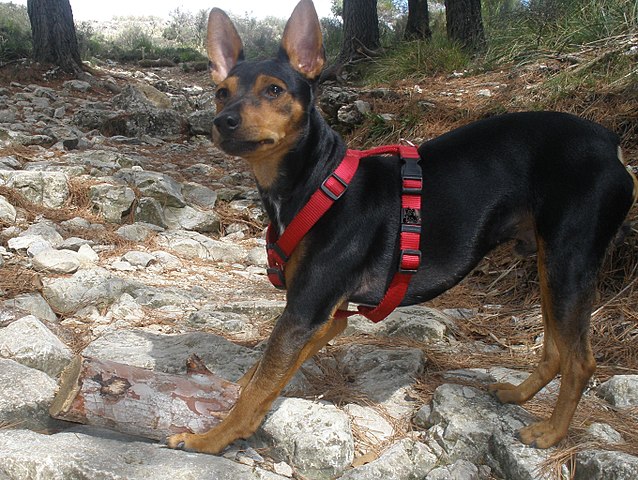The Manchester Terrier comes in two varieties – standard and toy. Standards are considered a small breed dog (22 pounds at the heaviest), which toys are true “tinies” (no larger than 12 pounds). With only one other difference between the sizes (the ear set), both standard and toy have the same personality. This very old breed is athletic and versatile, and makes a great family pet in a variety of situations. They adapt well to all manner of living circumstances including busy family life, quiet apartment life, as well as an active working life. Manchesters have been used as service dogs, in obedience/agility/rally trials, as coursers and as ratters. As long as they are able to spend time with their owners, they are happy (they are exceptionally cuddly).
Considered to be intelligent, the Manchester can be trained in many different avenues. The breed is incredibly observant and is capable of learning new things quickly. Many will take time to think about new situations presented to them before they act. They will do this not only during formal training sessions, but also in everyday life. Manchesters are a breed that greatly benefit from having a job (or several jobs) to keep their brains and bodies active. In fact, with owners that are pushovers, a Manchester is apt to try and take control of everyday life. Obedience is a necessity, not a choice! One caveat about obedience this breed has a high chase drive and might ignore a command if they spy a quick animal or object – keep them in fenced areas! One further caveat – although incredibly smart, these little guys can be stubborn. Consistency is key!
Like many smaller breeds, these black and tan terriers have long lifespans – 15 years and above is not considered abnormal. They are therefore a big commitment, not one to enter into lightly. Manchesters are very loyal dogs that bond tightly to their owners. They should never have to undergo constant owner changes, unless under the most dire circumstances.
While friendly with those he knows, the Manchester is usually reserved with strangers and needs some time to warm up to them before inviting them into “his circle”. Some Manchesters do have a protective streak which may occasionally cause problems. It is best to socialize them early and extensively, and put them in situations which optimize social behavior while they are young (and throughout their lives). Aside from this occasional issue, Manchesters are normally very sweet and “soft” dogs – differentiating them from the majority of terriers. They lack the harsh terrier edge and are, instead, quite sensitive to the world around them. 
Barking can become a bad habit with the Manchester Terrier if not kept in check, particularly if the dog is left home alone for long periods of time (separation anxiety is common in the breed). Some owners don’t mind the noise, however, because it may give a possible intruder second thought about entering the home. Manchesters often sound bigger than they actually are, which is an additional deterrent!
While generally easy to housebreak, Manchesters may “forget” this training when it’s cold and wet outside. It may be best to give them a sweater or raincoat when on walks in cold weather! When the weather is nice, these little terriers can often be found sunbathing. Sometimes, when in more mischevious moods… they can be found digging holes in the yard. These are terriers, after all. Finally, Manchesters are also apt to chase after and kill small critters that come into the yard. This comes with the territory of owning the breed.
If brought up with them, these little terriers get along great with other dogs as well as cats. They might, however, chase a strange cat that they do not know. They are also great with children, although their sensitive nature and small size makes them better for older kids rather than younger. Some Manchesters will snap if hurt, so it is only fair not to put them in this situation.
It is important to keep the Manchester exercised, although his small size normally makes this an easy task (particularly for toys). Since he is so adaptable, an owner can often get away with a short walk, although most Manchesters prefer longer excursions out. More active owners are often delighted to find out that this breed is usually game for more strenuous exercise and can make a great hiking companion. Joggers might have a more difficult time – while these terriers can sprint and are very fast animals for their size, their short stature means they probably can’t go on extended runs. Whichever form of exercise is chosen, the only non-option is not to exercise. This isn’t a lazy, sedentary breed and he does need to get out every day!



